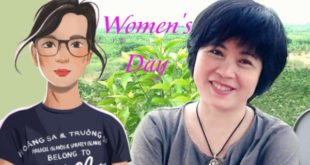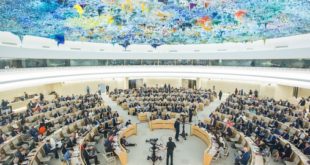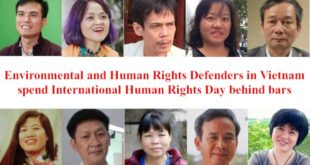PARIS, 13th March 2008 (Vietnam Committee) – Only one day after the US State Department roundly condemned Vietnam’s human rights record in its 2007 Country Report on Human Rights Practices, US Assistant Secretary of State for East Asian and Pacific Affairs, Christopher Hill gave a contradicting evaluation of Vietnam’s “expanded” religious freedom at a US Senate Hearing on Wednesday 12 March 2008. Assistant Secretary Hill, who recently visited Vietnam, was testifying before the US Senate Foreign Relations Committee’s Subcommittee on East Asian and Pacific Affairs at a Hearing on “U.S.-Vietnam Bilateral Relations”. This important Hearing is held as the Senate prepares to vote on the Vietnam Human Rights Act (H.R. 3096), passed overwhelmingly by the House of Representatives last September, which would link US-Vietnam trade relations to the respect of human rights.
Shocked by Mr. Hill’s remarks that “religious freedom in Vietnam has expanded significantly” and that “Vietnam no longer qualifies as a serious violator of religious freedom”, Mr. Vo Van Ai, President of Quê Me: Action for Democracy in Vietnam and International Spokesman of the banned Unified Buddhist Church of Vietnam (UBCV) sent a letter today to Senator Barbara Boxer, Chairman of the Subcommittee on East Asian and Pacific Affairs expressing deep concern that Mr. Hill’s testimony “gave an incorrect and misleading assessment of Vietnam’s alleged “progress” on religious freedom”. In view of the upcoming vote in the Senate, Mr. Vo Van Ai drew Senator Boxer’s attention to the following “grave errors and omissions” in the State Department’s official’s testimony:
“a) Assistant Secretary Hill states that Vietnam has introduced a new law that “enshrined individual freedom of religion”. This statement is both misleading and incorrect. The 2004 “Ordinance on Beliefs and Religions” to which Mr. Hill refers formally guarantees religious freedom, but virtually nullifies its exercise by banning the “abuse” of religious freedom to contravene Communist Party policies (article 8) and prohibiting all religious activities deemed to “violate national security…sow divisions… negatively affect the unity of the people or the nation’s fine cultural traditions” (article 15). Indeed, the Ordinance’s very definition of “religion” (“an organization of people who follow rites and tenets that do not go against the nation’s fine customs and traditions… and national interests”) means that religions in Vietnam can only exist if they comply with state interests. The communist State is thus empowered to decide which religions are “legitimate” and which shall be banned.
“b) As Mr Hill states, the “Ordinance” provides new measures for non-recognized religious groups to apply for registration. However, he does not reflect the 2007 State Department Report’s concerns that this process is often “slow and nontransparent”, marred by “excessive delays, and in some cases inaction”, “inconsistent application of procedures”, “continued restrictions on religious recruitment”, “unresolved land appropriation”, and that even followers of recognized religions suffer “harassment by local authorities”.
“c) Vietnam’s majority religion is Buddhism, which was introduced into Vietnam 2,000 years ago. Yet there is not one mention of Buddhism in Mr. Hill’s testimony on religious freedom. When he affirms that “Vietnam no longer qualifies as a severe violator of religious freedom. Key religious leaders from different faiths within the country have confirmed this”, one regrets he did not consult “key religious leaders” such as the UBCV Patriarch Thich Huyen Quang or his Deputy Thich Quang Do, both detained for the past 26 years for their peaceful advocacy of religious freedom. Unfortunately, Mr. Hill did not visit these UBCV leaders during his trip to Vietnam. If he had done, he would realize that UBCV members are the target of systematic repression, harassments and controls. UBCV Patriarch Thich Huyen Quang and Thich Quang Do are prisoners within their own monasteries, forbidden to travel and under permanent Police surveillance.
“Some brief examples of the daily repression against the UBCV: on 25 February 2008, 200 Security Police surrounded Nguyen Thieu Monastery in Binh Dinh where UBCV Patriarch Thich Huyen Quang, 88, is under house arrest. Their aim was to prevent Thich Huyen Quang from leaving the Monastery to pay traditional Lunar New Year visits, and prevent him from receiving the many delegations of UBCV monks and nuns who had traveled from the Central Highlands, southern and central provinces to pay him their respects. The Patriach’s private secretary, Thich Dong Tho, reported that Police climbed over the Monastery’s gates, swarmed into the grounds and broke into the Monastery. When Thich Dong Tho and some other monks tried to prevent them, Security Police threw stones at them. A few days later, on 29 February, as Thich Dong Tho went to visit a local pagoda, a Security Police vehicle crashed into his Honda, causing him to fall and incur grave head injuries and several broken teeth. If he had not been wearing a helmet, UBCV monks said, his fall could have been fatal. Moreover, on 23 February, Security Police came to the Nguyen Thieu Monastery in Binh Dinh to formally prohibit UBCV Patriarch Thich Huyen Quang, from attending the traditional Memorial Ceremony at the famous Thap Tap Monastery for its Founder, To Phuoc Hue. Thap Tap Monastery, which belongs to the UBCV, is only 20 kms. from Nguyen Thieu. Over 100,000 UBCV Buddhists attended the Memorial Ceremony on 27th February 2008 in the hope of greeting the UBCV Patriarch. These are typical harassments suffered by UBCV followers and members of all non-recognized religions in Vietnam;
“d) Repression against Hoa Hao Buddhists, four of whom were sentenced to 4-6 years imprisonment in 2007 and another 10 detained in 2005, according to the State Department’s Report, is not mentioned. Nor is the forced de-frocking of Khmer Krom Buddhist monks in 2007. Nor the continued detention of Christian Montagnards;
“e) Last but not least, Mr. Hill states that Vietnam has “addressed the problems that constituted serious violations of religious freedom as defined by the 1998 US International Religious Freedom Act”. This remark is totally inconsistent with the recommendations made by the US International Commission for Religious Freedom (USCIRF), the independent body established under that very 1998 International Religious Freedom Act to advise the Congress and the US President. Indeed, the USCIRF has recommended that Vietnam be maintained on the backlist of “Countries of Particular Concern” for its grave religious freedom abuses. In October 2007, a top-level USCRF delegation made a two-week visit to Vietnam, holding private meetings with UBCV Deputy leader Thich Quang Do at the Thanh Minh Zen Monastery on 26 October, and with senior UBCV official Thich Thien Hanh and Le Cong Cau, a leader of the UBCV’s Buddhist Youth Movement in Hue on 27 October, during which they heard extensive first-hand testimonies on Vietnam’s continuing repression against the outlawed UBCV. It is deeply regrettable that the USCIRF was not on the panel of witnesses at this Hearing to inform the Senate of their important findings.
In conclusion, Mr. Vo Van Ai wrote: “The situation of religious freedom in Vietnam is far more serious than Mr. Hill’s testimony suggests. I urge the Senate to vote in favour of the Vietnam Human Rights Act to ensure that religious freedom and human rights remain a core element of US-Vietnam relations. Economic development alone will not bring democracy to Vietnam. By supporting human rights as well as enhanced trade, you will positively impact the lives of 84 million people in Vietnam.
“I also call on the Senate to insist on concrete progress in religious freedom, beginning with the re-establishment of the UBCV’s legal status and that of other non-recognized religions, and the release of Supreme Patriarch Thich Huyen Quang and his Deputy Thich Quang Do. This a litmus test of Vietnam’s true commitment. The promises and pledges of its leadership are meaningless if they are not prepared to take these basic steps”.
 Quê Me Quê Me: Action for democracy in Vietnam & Vietnam Committee on Human Rights
Quê Me Quê Me: Action for democracy in Vietnam & Vietnam Committee on Human Rights




